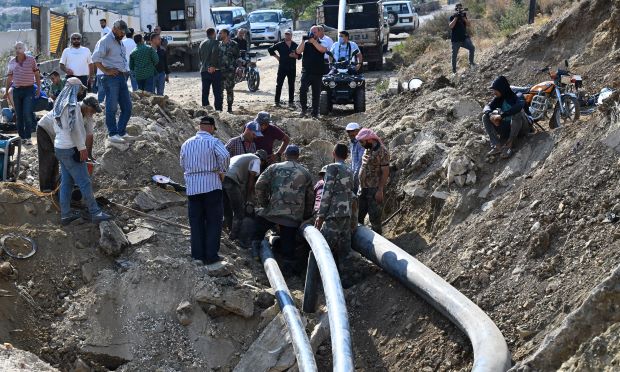Israeli strikes in Syria kill at least 25, war monitor says
State media says more than 40 injured as military research centre for arms production hit, according to sources
By Peter Beaumont
BEIRUT – Israeli jets have launched a substantial strike on targets in Syria, killing at least 25 people, according to an opposition war monitor that said it was one of the most violent such attacks in years.
The main target appeared to be a military research centre in Masyaf associated with Syria’s chemical and ballistic missiles program, but explosions were also heard in Damascus, Homs and Tartus. Syrian state media had put the death toll at 16 with 40 wounded.
The attack on Sunday (8) night struck targets associated with pro-Iranian militias as well as the ‘scientific research facility’ near Hama, reportedly run by Iran’s Revolutionary Guards.
The facility was one of several the International Atomic Energy Agency reportedly asked for access to following the 2007 destruction in airstrikes of Syria’s suspected al-Kibar nuclear reactor on the Euphrates. Israel confirmed in 2018 that its forces had been responsible.
The Syrian foreign ministry condemned the attacks as an act of blatant aggression but there was no immediate comment from the Israeli military. Israel has carried out hundreds of strikes on targets inside government-controlled parts of war-torn Syria in recent years, but it rarely acknowledges or discusses the operations. The strikes often target Syrian forces or Iranian-backed groups.
The UK-based Syrian Observatory for Human Rights, an opposition war monitor, described the Sunday night strike as “one of the most violent Israeli attacks” in Syria in years and said it was carried out with 14 missiles. It said among the people killed were “five civilians, four soldiers and intelligence personnel and 13 Syrians working with pro-Iran groups”.
The Israeli strikes, it said, “targeted the scientific research area in Masyaf […] destroying buildings and military centres” and sites “where pro-Iran groups and weapons development experts are stationed”.
The observatory’s head, Rami Abdel Rahman, said Iranian experts “developing arms including precision missiles and drones” worked in Masyaf. At least four of those who were killed were reported to be civilians.
Israel has vowed to stop Iranian entrenchment in Syria, particularly since Syria is a key route for Iran to send weapons to the Lebanese militant group Hezbollah which has been clashing with Israel over its northern border for the past 11 months against the backdrop of the Gaza war.
Israeli raids on Iranian-backed militia targets in Syria surged after the October 7 attacks by Hamas on Israeli civilians and soldiers that triggered the Gaza conflict, then eased somewhat after a strike on April 1 blamed on Israel hit the Iranian consular building in Damascus. That attack, the most high-profile attack on Syria since the war in Gaza began, killed seven military advisers, including three senior commanders, according to Iran.
Israel has also struck Syrian army air defences and some Syrian forces.
A Syrian military source confirmed the Sunday night attack to the Sana news agency. “At around 23:20 on Sunday evening, the Israeli enemy launched an air aggression from the direction of north-western Lebanon, targeting a number of military sites in the central region [of Syria],” the source said.
“Our air defence systems confronted the aggression’s missiles and shot down some of them,” the source added, without providing further details.
Syria’s state media also reported that the strikes caused two fires, which firefighters were working to extinguish.
Condemning the attack, Nasser Kanani, spokesperson for the Iranian foreign ministry, told a media briefing: “We strongly condemn this criminal attack by the Zionist regime on Syrian soil.”
Syria has sought to stay out of the Israel-Hamas conflict that has raised fears of a broader regional war across the Middle East.
Masyaf was also targeted by Israel in 2017 amid repeated claims that it was used to store short-range surface-to-surface missiles and chemical munitions.
-theguardian.com



Comments are closed, but trackbacks and pingbacks are open.